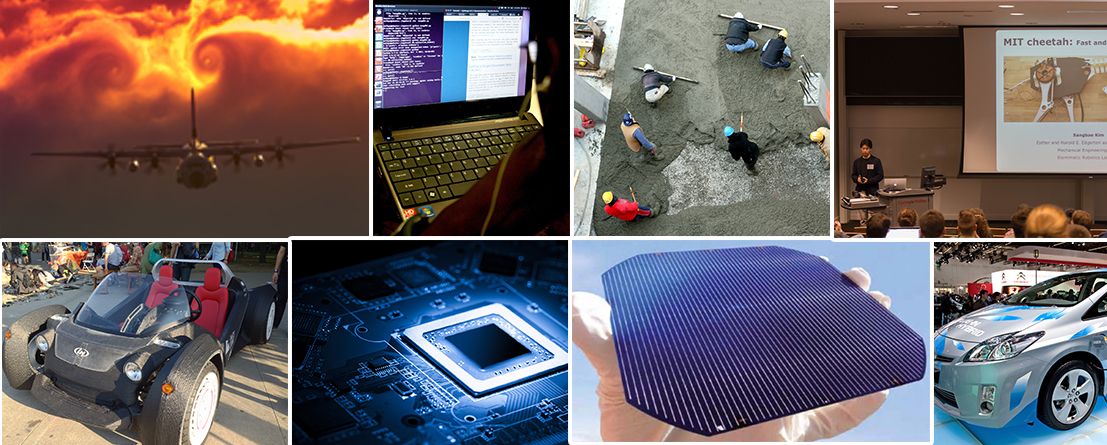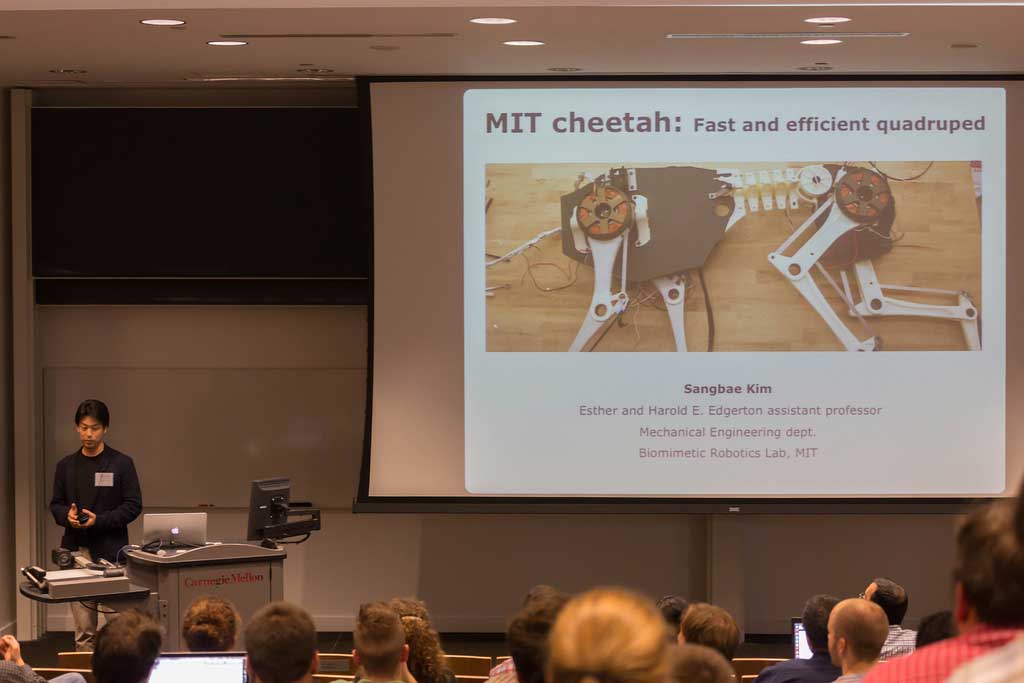
Around three thousand years ago humans discovered that it was easier to roll heavy objects on a round
tree log. Hence came the idea of building the mechanical wheel – one of the first significant engineering
inventions. Indeed, engineering inventions have been crucial to help us realize life as it is today. Our
quest to evolve deeper understanding of science and technology results in more ingenious inventions
spawning almost each day. The wheel itself has come a long way ahead from the primitive wooden
design. Take for instance the Active Wheel System - a present day invention which shelters the engine,
suspension, gearbox and transmission systems all incorporated into the wheel itself!
In 2014, we had a host of incredible engineering inventions. This article takes a look at some of the
engineering breakthroughs which we think were compelling. Here are the inventions categorized by
various engineering disciplines:
Read more..
Automobile Engineering
Depleting sources of fossil fuels has forced us to look into electrical alternatives to power future
automobiles. Researchers from Singapore’s Nanyang Technological University (NTU) designed a novel
two-in-one electric motor that promises to increase range of electric vehicles by 15 to 20 percent. The
design merges the air-conditioning compressor with a traditional electric motor. This allows extra space
for using bigger batteries which in turn will help electric cars to cover more distances. Additionally, this
electric motor achieves greater efficiency with lesser energy costs.
Projects on Innovative Technologies
Want to develop practical skills on innovative technologies? Checkout our projects and start learning for free
In another achievement, researchers at University of Wisconsin-Madison created an engine that
converted 59.5 percent fuel energy to motion – the highest recorded efficiency till date. With the help of
sensors and computers, the engine system could vary a mixture of diesel and petrol to reduce heat
losses from the engine.
 Did you know
Did you know
Skyfi Labs helps students develop skills in a hands-on manner through
Mechanical Online Courses
where you learn by building real-world projects.
You can enrol with friends and receive kits at your doorstep.
You can learn from experts, build working projects, showcase skills to the world and
grab the best jobs.
Start Learning Mechanical today!
Aerospace Engineering
Turbulence, or unsteady flow of air, causes an airplane to wobble in midair much to the displeasure of
nervous passengers. Inspired by birds, researchers at Melbourne’s RMIT University have devised an
effective anti-turbulent system that will calm down those nerves. Birds counter turbulence by detecting
shifts in wind and airflow with their feathers. The system tries to replicate this natural phenomenon by
sensing flow disturbances prematurely.
2014 also saw the world’s first biodegradable drone in the world made with bacteria, fungi and saliva of
wasps - which decay into Earth material when the drone crashes. Elsewhere, researchers are trying to
replicate the ability of birds to flex their feathers into aircraft designs. More on that later. We would also
like to give a special mention to ISRO’s successful Mangalyaan mission, which made India the only
country to reach Mars in the first try!
Mechanical Engineering
3D Printing is an ever rising manufacturing technology, and this year it has emerged even more. 3D
Printing inventions are coming up almost every day. But the one that caught our eye was Strati, the first
fully operational 3D Printed car designed by Local Motors from America. It took 44 hours to print the car
components and another two days to assemble them. Consider this – the car only has 40 components as
compared to 20,000 components of an average car. Local Motors say that they designed the car this way
to reduce tooling costs and overall complexity.
3D Printing technology has indeed captured the imagination of engineering minds across the globe.
From human organs to concrete, almost everything can be 3D printed now. Space agency NASA
achieved the amazing this year when they orchestrated 3D printing of objects at zero gravity. The space
crew at the International Space Station even manufactured a broken wrench using the 3D printer!
Robotics Engineering
The first kick of the football world cup was done by a paralyzed person wearing a brain-controlled
robotic exoskeleton! Advances in neuroscience and artificial intelligence clearly made it possible. As it is
always, robots showcase the latest in science and technology. Among interesting robotic inventions, we
saw a robot that could move like a sidewinder snake. Researchers also created the first untethered soft
robot which remained unaffected by harsh conditions – it even survived when run over by a car! But
researchers from Massachusetts Institute of Technology came up with two inventions that impressed us
the most, the first one being a robot with unprecedented dexterity – equipped with a unique GelSight
sensor that uses optics and computer vision algorithms to drastically improve robotic precision. The
other invention from MIT was an advanced version of the Cheetah robot that used custom-built motors,
and a new bounding algorithm allowing the robot to exert measured forces on the ground before
leaping ahead!
Electrical Engineering
Researchers at Chalmers University of Technology build a microwave circuit that transmitted data at 40
gigabytes per second! In University of Arkansas an integrated circuit was designed which can bear
temperatures greater than 350 degrees Celsius! Engineers from NTU were able to print complex circuits
on everyday materials like plastic, aluminum foil, and paper! But Polytechnic University of Valencia
made the most buzzworthy invention – an energy transfer device that can charge any device wirelessly.
The device cleverly uses resonance coupling between an energy transmitter and the chargeable device
to achieve the needed transfer of electrical energy.
Energy Systems Engineering
In a radical development, energy experts from Australia’s University of New South Wales managed to
convert 40 percent of sunlight received by solar panels into electricity - setting a world record in solar
energy efficiency! To achieve this feat, they stacked three solar panels which captured separate waves
of sunlight. The excessive sunlight, that generally gets wasted, was diverted using custom optical band
pass filters and mirrors onto a fourth cell – staggeringly increasing the efficiency. Meanwhile, German
scientists converted 46 percent of sunlight to electricity in a laboratory environment. The system
captured more light by implementing multi-junction solar cells made of numerous semiconductors.
Another breakthrough was achieved by NTU researchers to develop a battery that remarkably lasts 20
years! They used ultra-thin Titanium dioxide anode that abundantly speeds up the chemical processes
for superfast charging.
Civil Engineering
In 2014, a host of methods were invented to improve concrete use. Reducing the constituent Calcium to
Silicate ratio, Civil Engineering experts at MIT produced stronger and durable concrete with 50 percent
reduced carbon emissions. Experimenters at North Carolina State University conceived a sensing skin
technology integrating electrodes and computing to quickly detect cracks or damage in concrete
structures.
In another successful experiment, Swiss researchers proved that shape memory alloys can be used in
the building industry for applications like reinforcement of bridges. As the name suggests, a shape
memory alloy remembers its shape when deformed. These materials could be used to overcome
concrete’s weakness in tension – offering an alternative to prestressed concrete.
Computer Science Engineering
The most striking computing technology in our opinion came from Google with the No CAPTCHA
reCAPTCHA application programming interface which allows users to confirm they are human by simply
clicking a checkbox saying - I’m not a robot. The sophisticated system can analyze simple human
movements like a pause before clicking a checkbox.
Computer scientists at Carnegie Mellon University developed Wyvern, a programming language which
facilitates the use of multiple languages for one programming task. Wyvern is the first type specific
language that understands and converts literals across various types of programming languages.
These were the interesting engineering innovations of 2014 that grabbed our attention. Do comment
below if we missed out on any developments.
Interesting Engineering Innovations of 2014
Skyfi Labs
•
Published:
2014-12-26 •
Last Updated:
2021-03-13
 Note:
Note:

 Did you know
Did you know






